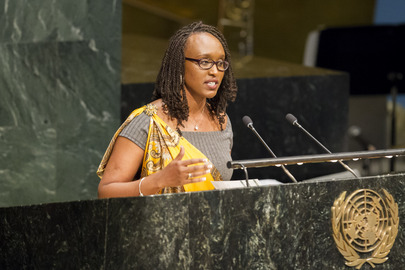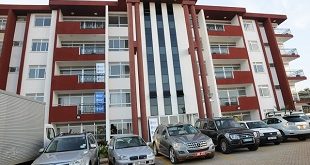
On the occasion of the 22nd commemoration of the 1994 Genocide against the Tutsi in Rwanda, at the UN headquarters in New York, on Monday, Frida Umuhoza, a survivor and author of “Frida: Chosen to Die, Destined to Live,” gave an emotional testimony of her personal experience of the Genocide. “To be shot, you had to pay ReF5000 (Uganda shillings 21,543) ADAPTED FROM NEW TIMES Rwanda
Excerpts;-
I was only 14 when the Genocide started. At the age of 6 I already knew I was a wrong tribe, Tutsi tribe.
I was not told by my parents that I was a Tutsi, but by my best friend who was aged 6 as well, she told me that we both were Tutsi since her grandfather had already been killed so, she knew who she was.
Every three months in our school, the principal came in to count how many Hutu, Tutsi and Batwa kids were in our class. So, as children we knew who was who.
In April 1994, we had to leave our home since the killings had started and homes were being burnt or demolished. We ran around trying to find a neighbour who would be compassionate enough to hide us. My father went his way, my mom and brothers went their way and my sister, my cousin and I were sent to a neighbour who refused to have us, saying he did not want our blood on his hands.
After one month, it was said that the killing had stopped, but it was a lie. They lied to us so we could come back home and have us killed. We decided to then go back home, but my home was completely demolished. We then went to my grandfather’s house and found that my grandfather was still alive.
The following day my mother and my three brothers and two other little boys of my mom’s best friend came home too. My father, who was still alive by then, also came back. In the end we were 18 people in that house that was partially demolished.
My father stayed hidden on the roof of our house. A few days after we had returned home, a lot of other people in that village returned too. They then took all of us to the roadblock. When we got there we were asked to pay for a grenade since we were too cheap for a bullet so they said. In my village, to be shot you had to pay Rwf5,000, but we were too poor at that time to pay for own death.
Since we could not pay for a grenade, they said they were tired we were asked to return home. Three days later, we were told by a young man who was a friend of my brother that they had a meeting about our day, which was going to be May 7.
Early morning on that day, children at our neighbours’ were crying, screaming and begging for mercy, saying they will never be Tutsi again. The next turn was ours, a young man whom we knew well came in the room where we were hiding. He looked like he had been killing because he had blood on his clothes and on his machete. I think he had a little bit of compassion left in him too because he walked out when he saw how scared we all were.
He then lied to his group leader that we were not there anymore, but his leader refused to believe him. The leader came in himself and when he saw how many we were, he mocked us and led us outside telling the young man that if he wanted to be forgiven of that ‘crime’ of trying to hide us he would have to kill 10 of us.
We were then led to the ditch where we were to be buried. At that time my father was following all that was going on but did not come down. I have always believed that every little girl thinks and sees their own father as the strongest man; in my case during the Genocide, the strength of my father was taken away by those who killed him and all I saw was a weak and fearful man.
Laying down in the ditch, my grandfather tried to talk to our killers, begging them to let us go, but one guy jumped in the ditch and hit him with a club. It is at that moment that they all jumped in and started killing us all with their weapons.
My young brothers that were nine and 11 were screaming. I saw my mom’s head being chopped off, and when I saw blood I covered my face, that is when a man I had chosen to kill me hit me at the back of my head with a club and I fell unconscious. I’m not sure how long I was unconscious, but when I came through again, they had already started burying us.
When I realised that they were burying, found out that I was bleeding from my nose, and hearing them talk as if nothing had happened made me then keep quiet because I knew that if they discovered that I was still alive they would pull me aside, may be rape me and finish me off.
Buried alive, hearing my aunt and 16-year-old sister taking their last breath is an experience I will never forget.
For hours and hours in that shallow grave, trying to call for help and praying, in the end a lady that was not too far away heard my voice. She was so scared thinking it was a ghost since she knew it was just a grave, but hearing a voice coming out of it was strange and scary to her. She ran and told a young man of what she had heard and this young man pulled me out.
Right after I was pulled out I heard the men who had just killed my father (who offered himself to die after he watched what was done to his family) celebrating. My hope of seeing him and surviving was destroyed.
The next day I was hid by a Hutu. This man hid me until the RPF rescued us. The reality that I was all alone and that my whole family was gone was too painful.
The Genocide was stopped by Rwandans, the RPF that had the courage to give their lives away for us. They fought hard to rescue us, and stop the saying “we will wipe all of them out to the point a stranger will ask what a Tutsi looked like”
It is the Rwandans themselves led by President Paul Kagame that rescued the Rwanda of today.
As a survivor, I went through all stages of a survivor. From being angry to the pain that have no words to express. But I choose not to be defined by pain, and I chose to be a better woman each day not bitter.
Telling my story, our story as survivors, is not to attract pity but to raise awareness of what happened to us and a million Tutsi that were lost within just a hundred days.
To tell our story is to fight genocide ideology as it is this year’s theme. Telling our story helps fight Genocide denial for that is the last step of a genocide itself.
To tell our story is to remind the international community that saying ‘never again’ is not enough, but acting upon it is what is necessary.
Finally, encouraging my fellow survivors to keep the hope alive and to not let the pain define who they are. To be able to preserve the dignity that was stolen from us, having the courage to work hard and keep moving forward.
That is my story and God bless you all.
 The Independent Uganda: You get the Truth we Pay the Price
The Independent Uganda: You get the Truth we Pay the Price


